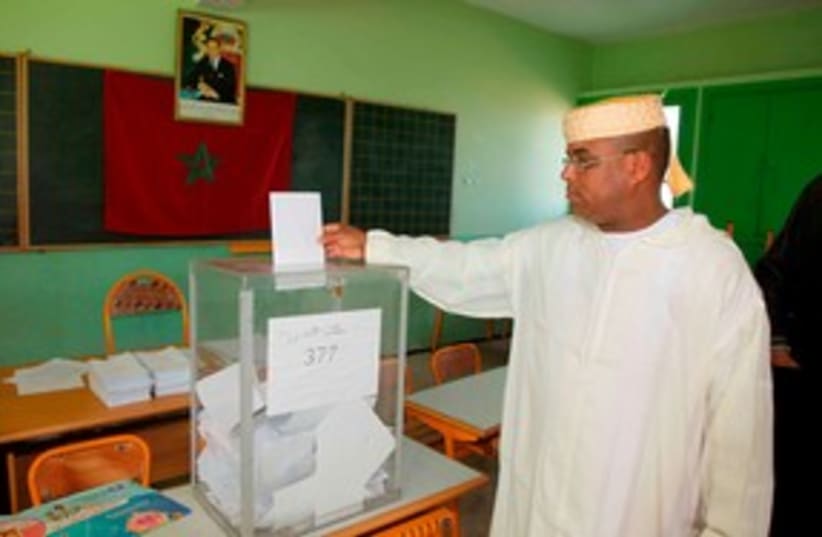Imagine a democracy where the electorate has grown so disillusioned with the antiquated political parties that, in a parliamentary election, most of the electorate doesn’t vote at all. As a result, the God-squad wins enough seats to lead and dominate a coalition with the old parties.
Could it happen in your country? How would you feel about it?
And if the new Prime Minister were to be an Islamist? Welcome to Morocco 2012! Moroccan Prime Minister Abdelilah Benkirane of the Islamic Party of Justice and Development (PJD), after six weeks of negotiations, has just formed his first administration and is about to seek parliamentary approval for it.
It matters to the entire Middle East. For if this Islamic-led coalition (unprecedented for Morocco) succeeds or fails in its stated aims of combatting corruption, bad governance and poverty, other countries may follow or flee in the opposite direction.
It matters to Jews too, because Morocco’s Jewish community is the last of the great communities of the Arab World, the only one still to be counted in thousands. It is the only one to have excellent relations with its Muslim neighbors, and the only one where all the Jews truly love their head of state, King Mohammed VI, deeply, whatever their political views. (Even Jewish Communists, such as the recently departed militant Abraham Serfaty, Jewish Museum founder Simon Levy and novelist Edmond El Maleh all loved this King).
Why? Because he cares. Other leaders use their years in office to feather their nests at public expense and without public benefit. But this king indefatigably runs around the country opening schools, hospitals, and new housing and tourist developments, successfully encouraging foreign investment.
Morocco is booming in the development of its land. And the democratic freedoms achieved under him are greater than in any other Arab state. He’s been doing it since 1999. When the oppressed of North Africa swept away their leaders with a revolutionary broom in 2011, nobody sought to replace the king – most of the people love him; many even see him as sacred.
But the People are fed up with corruption among the rest of the establishment, many demonstrated against it, and voted in November for change. The PJD won almost twice as many votes as its nationalist pro-monarchical rival Istiqlal party, which had headed the previous government. The king accepted the voice of the People, appointed Benkirane as Premier, and accepted his choice of Ministers, including members of the Istiqlal, the economically liberal Mouvement Populaire, and, astonishingly, the former communist Party of Progress and Socialism!
Nonetheless, the country’s political liberals and many others are far from happy. The PJD successfully vetoed a freedom of conscience clause in the new Constitution, even before the elections. There is only one woman minister in the new government, whereas there were seven in the previous coalition; and she is from the PJD, always covers her head in public and leads the ministry of Women and Family! Also, prior to the elections Benkirane himself poked fun at the Berber language movement (even though the majority of Moroccans have Berber blood), castigated those who eat in public during Ramadan, and weighed into singers Elton John and Shakira for their influence on his country’s youth.
Leading Moroccan novelist Tahar Ben Jelloun, sworn enemy of political Islam, says Islam is for the Mosque and not for politics. He adds that PJD is proclaiming a decaffeinated form of Islam, but, behind the scenes, its religious agenda is backwards and dangerous. He tells of one PJD militant who got people to vote for the party, by claiming that Allah would reward them. Ben Jelloun also fears the marauding camel’s nose in the tent. For, once the nose is inside, the rest of the camel will follow.
Benkirane has, however done all he can to placate fears since the run-up to the November general election. He promised not to introduce Sharia (Islamic law) or to ban alcohol (a much loved consolation of the poor). He vowed to introduce new faces, and, indeed, two thirds of the ministers have not sat in government before. Most importantly, he pledged to fight the corruption and poverty, which have plagued this country.
Is this all a mere charade to enable him to form a coalition? Is it rather pragmatic Realpolitik, to prevent the end of much needed Western investment and tourism? Or is he wholly sincere, abandoning some of his party’s previous platform for the sweet taste of power? Time will tell.
Is there really reason to fear the new government? It is highly unlikely, that this variegated coalition will try and introduce severe restrictions on human rights. Even if the coalition does try, the king retains such enormous power as to be able to block them. There are enough checks and balances to stop any major deterioration.
Because of the new faces in the administration, if ever a government has had the ability to root out corrupt practices, it is this one, for the PJD has clean hands up to now. If it also succeeds in alleviating poverty, the coalition will unify most of the country behind it. Let’s give it a chance, before rushing to judgment.
The writer runs a Europe and Mediterranean-based international law office, has Oxford law degrees, and is a frequent commentator on North Africa and a former Fellow of the Harry S. Truman Institute.
